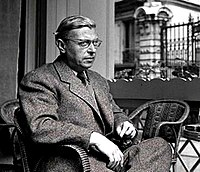Antinovel

| Literature | ||||||
|---|---|---|---|---|---|---|
 | ||||||
| Oral literature | ||||||
| Major written forms | ||||||
|
||||||
| Prose genres | ||||||
|
||||||
| Poetry genres | ||||||
|
||||||
| Dramatic genres | ||||||
| History | ||||||
| Lists and outlines | ||||||
| Theory and criticism | ||||||
|
| ||||||
An antinovel is any experimental work of fiction that avoids the familiar conventions of the novel.
Origin of the term
The term ("anti-roman" in French) was brought into modern literary discourse by the French philosopher and critic Jean-Paul Sartre in his introduction to Nathalie Sarraute's 1948 work Portrait d’un inconnu (Portrait of a Man Unknown).[1] However the term "anti-roman" (anti-novel) had been used by Charles Sorel in 1633 to describe the parodic nature of his prose fiction Le Berger extravagant.[2][3]
Characteristics
The antinovel usually fragments and distorts the experience of its characters, presenting events outside of chronological order and attempting to disrupt the idea of characters with unified and stable personalities.
History
Although the term is most commonly applied to the French nouveau roman of the 1940s, 1950s and 1960s, similar traits can be found much further back in literary history. One example is Laurence Sterne's Tristram Shandy, a seemingly autobiographical novel that barely makes it as far as the title character's birth thanks to numerous digressions and a rejection of linear chronology.[1]
Aron Kibédi Varga has suggested that the novel in fact began as an anti-novel, since the first novels such as Don Quixote subverted their form even as they were constructing the form of the novel.[2]
Examples
Examples of antinovels are:
- Brian Aldiss: Report on Probability A
- Giannina Braschi:Yo-Yo Boing!
- Julio Cortázar: Hopscotch
- Rayner Heppenstall: Connecting Door (1962)[1]
- Uwe Johnson: Mutmassungen über Jakob (Speculations about Jacob)[1]
- Vladimir Nabokov: Pale Fire
See also
References
- ^ a b c d "New Novel." Encyclopædia Britannica. Encyclopædia Britannica Online Academic Edition. Encyclopædia Britannica Inc., 2012. Web. 31 Aug. 2012.
- ^ a b Dionne U, Gingras F. L'USURE ORIGINELLE DU ROMAN: ROMAN ET ANTIROMAN DU MOYEN AGE A LA REVOLUTION. (French). Études Françaises. April 2006;42(1):5-12. Accessed August 31, 2012.
- ^ Hodgson R. "The Parody of Traditional Narrative Structures in the French Anti-Novel from Charles Sorel to Diderot". Neophilologus. July 1982;66(3):340-348. Accessed August 31, 2012.
